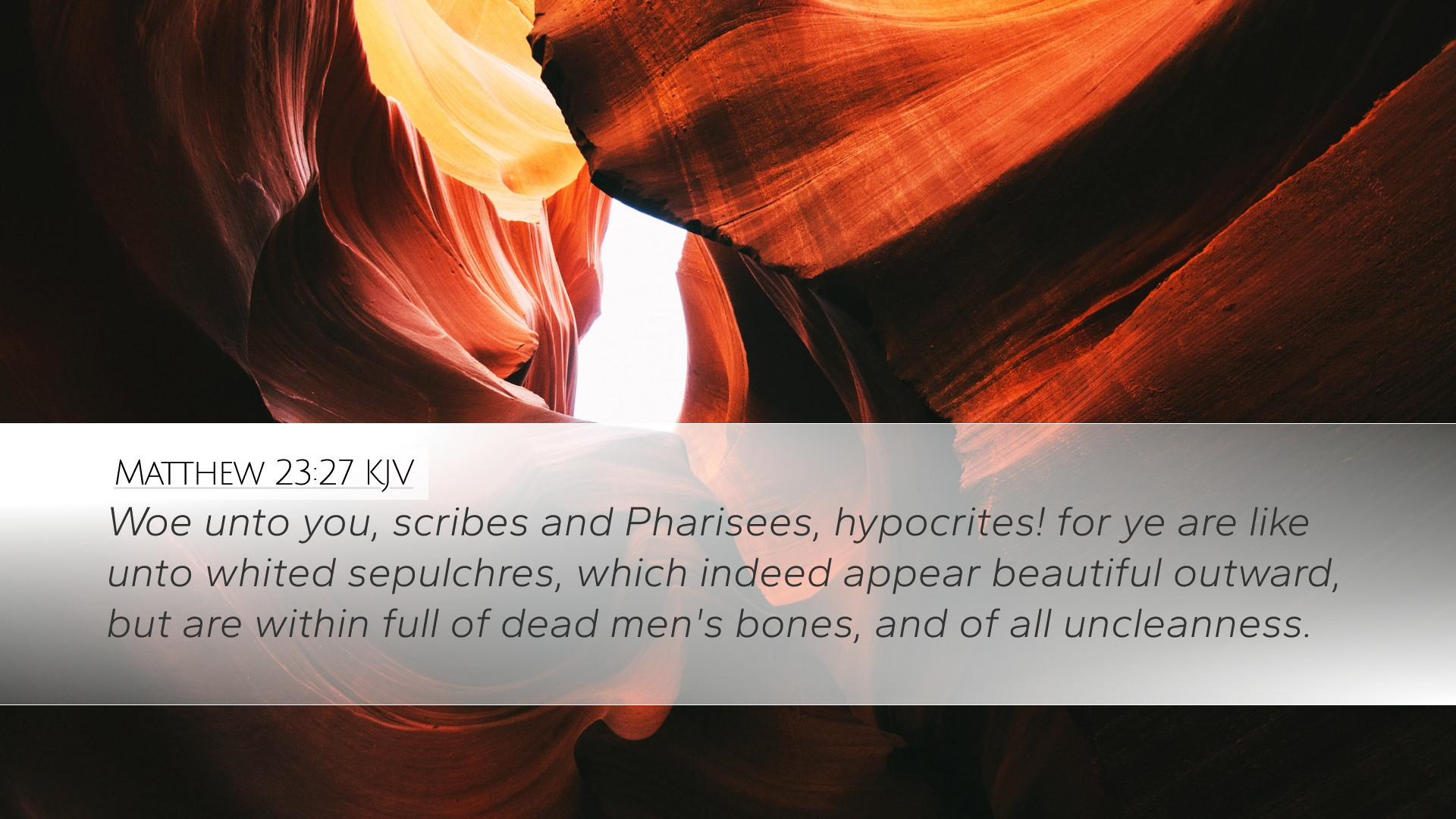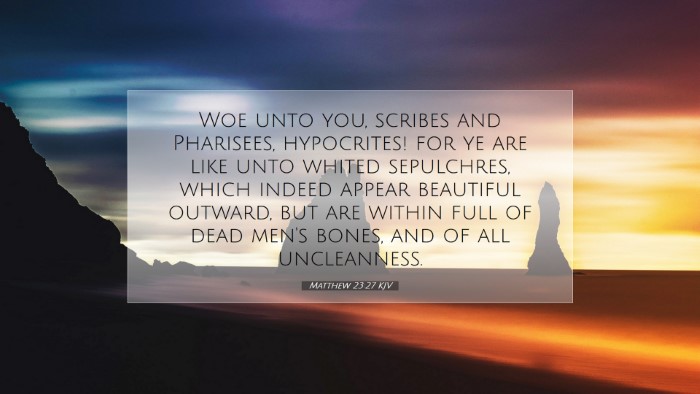Commentary on Matthew 23:27
Matthew 23:27 states:
"Woe unto you, scribes and Pharisees, hypocrites! For ye are like unto whited sepulchers, which indeed appear beautiful outward, but are within full of dead men’s bones, and of all uncleanness."
Context and Overview
This verse is part of a larger discourse where Jesus addresses the religious leaders of His time, notably the scribes and the Pharisees, criticizing their hypocrisy and outward displays of righteousness. Throughout Matthew 23, Jesus issues a series of woes that serve as both a condemnation of the religious leaders and a warning against the dangers of superficial faith.
Commentary Insights
1. Hypocrisy and Deception
Matthew Henry notes that the term "hypocrite" highlights the discrepancy between the Pharisees' outward behavior and their inner reality. They presented themselves as righteous, yet their hearts were devoid of true godliness.
These leaders had a façade of holiness, exemplifying the external compliance to the law, but internally they were corrupt.
2. The Metaphor of Whited Sepulchers
Adam Clarke illustrates this metaphor further by explaining that sepulchers were often painted white to make them appear attractive and to ensure they were easily identifiable, especially in a time when contact with the dead was considered unclean. Similarly, the Pharisees adorned themselves with rituals and laws that gave the appearance of purity, while their souls were filled with spiritual death.
This duality serves as a cautionary tale, emphasizing the importance of internal integrity and genuine faith over mere appearance.
3. The Nature of Inner Corruption
Albert Barnes adds depth to the understanding of "full of dead men’s bones." This phrase suggests not just the presence of sin but a state of complete moral decay. The imagery evokes thoughts of death and decay, indicative of the spiritual barrenness found among those who focus solely on external observances without the corresponding inner transformation.
4. Implications for Leadership
For pastors and church leaders, this verse serves as a critical reminder of the dangers of leading a congregation while harboring hypocrisy. The call to genuine faith is paramount as the church’s health often relies on the integrity of its shepherds.
- Self-Reflection: Leaders must consistently evaluate their own lives, ensuring that their public persona aligns with their private faith.
- Authenticity: There is a need for authentic expressions of faith that influence congregational culture positively.
5. The Call for True Righteousness
Matthew Henry emphasizes that Jesus' denunciation is not merely against the Pharisees but serves as a universal warning. It challenges all believers to examine the authenticity of their faith. True righteousness is not found in outward observances but in the transformative work of the Holy Spirit within the believer.
The Theological Significance
This verse encapsulates a pivotal theme in the New Testament: the conflict between law and grace. The Pharisees represented a perversion of the law, using it as a tool for self-righteousness while neglecting the weightier matters of justice, mercy, and faith.
It raises essential theological questions regarding the nature of true religious devotion and the heart's posture before God.
Practical Application
- For Students of Theology: This verse invites a rigorous study of the boundaries between law and grace, emphasizing the necessity of heart change over ritual compliance.
- For Pastors: It serves as a call to shepherd with vulnerability and honesty, modeling the kind of faith that yields genuine transformation.
- For Scholars: The dynamics of religious authority and moral integrity showcased in this verse continue to possess relevance in contemporary discussions on leadership within the church.
Conclusion
Matthew 23:27 serves as a significant reminder of the dangers of hypocrisy within the faith community. It calls believers to pursue authenticity in their relationship with God, emphasizing that outward appearances cannot substitute for inward purity. As Jesus' words challenge the faithful to introspection, they also inspire a deeper pursuit of true righteousness amid the complexities of spiritual leadership.


